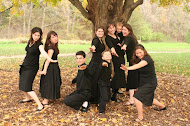Today is the 144 anniversary of Lincoln's Gettysburg Address.
In veiw of that I thought you might be interested
in a speech/essay I wrote for my forensics class three years ago...
*
*
‘Four score and seven years ago’ begins the well known quote. But how many of us know the story behind it?
In June of 1863, the Civil War had dragged on for two years, eradicating the hopes of both Southerners and Northerners that the war would be only a ‘breakfast spell’. Confederate General Robert E. Lee conceived a bold plan to crush the Union hopes and demoralize the support of the war by making the northern people feel that it was to big a price to pay. The Plan? He would march north into Pennsylvania, drawing the Union Army of the Potomac after him to destroy it. After which a peace treaty would be offered to Federal President Abraham Lincoln, who without an army, would be at the mercy of the Confederate Army of Northern Virginia. The Union and Confederate armies, the former under the command of George Meade and the latter under Robert E. Lee, meet at a little crossroads town. The fighting lasted three days. The climax came on the last day, when the Confederates sent 15,000 men, under the command of George Pickett, across open fields to assault entrenched Union soldiers at the top of Cemetery Ridge. This attack, known to history as Pickett’s Charge, failed to take the Ridge and left 10,000 men dead on the field. The Battle of Gettysburg, ending with the culmination of Pickett’s Charge was the turning point of the Civil War. The Confederacy was weakened and they never regained the supremacy they had lost. But only those of us who see the Civil War in retrospect realize the consequences that this battle had on the Confederacy and the Union. To the grieving families in the North and South, they only knew that, because of this battle, 51,000 of their fathers, their husbands, their sons and brothers were gone. On November 19, a cemetery for these dead was consecrated, on the land for which they had fought. It was at this consecration that Abraham Lincoln delivered his speech. He asked the remaining soldiers and people of the North to be dedicated to the unfinished work of the fallen soldiers,-that, in his own words, ‘these dead shall not have died in vain-that this nation, under God, shall have a new birth of freedom,- and that Government of the people, by the people, for the people, shall not perish for the earth.’
In June of 1863, the Civil War had dragged on for two years, eradicating the hopes of both Southerners and Northerners that the war would be only a ‘breakfast spell’. Confederate General Robert E. Lee conceived a bold plan to crush the Union hopes and demoralize the support of the war by making the northern people feel that it was to big a price to pay. The Plan? He would march north into Pennsylvania, drawing the Union Army of the Potomac after him to destroy it. After which a peace treaty would be offered to Federal President Abraham Lincoln, who without an army, would be at the mercy of the Confederate Army of Northern Virginia. The Union and Confederate armies, the former under the command of George Meade and the latter under Robert E. Lee, meet at a little crossroads town. The fighting lasted three days. The climax came on the last day, when the Confederates sent 15,000 men, under the command of George Pickett, across open fields to assault entrenched Union soldiers at the top of Cemetery Ridge. This attack, known to history as Pickett’s Charge, failed to take the Ridge and left 10,000 men dead on the field. The Battle of Gettysburg, ending with the culmination of Pickett’s Charge was the turning point of the Civil War. The Confederacy was weakened and they never regained the supremacy they had lost. But only those of us who see the Civil War in retrospect realize the consequences that this battle had on the Confederacy and the Union. To the grieving families in the North and South, they only knew that, because of this battle, 51,000 of their fathers, their husbands, their sons and brothers were gone. On November 19, a cemetery for these dead was consecrated, on the land for which they had fought. It was at this consecration that Abraham Lincoln delivered his speech. He asked the remaining soldiers and people of the North to be dedicated to the unfinished work of the fallen soldiers,-that, in his own words, ‘these dead shall not have died in vain-that this nation, under God, shall have a new birth of freedom,- and that Government of the people, by the people, for the people, shall not perish for the earth.’





0 comments:
Post a Comment